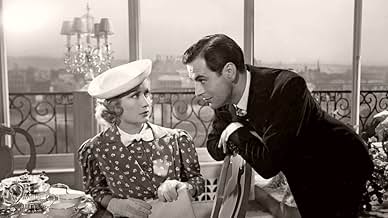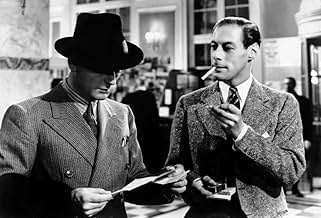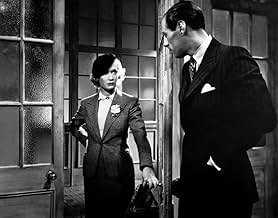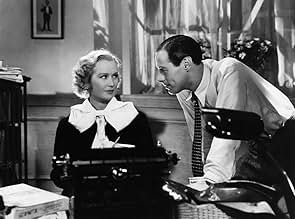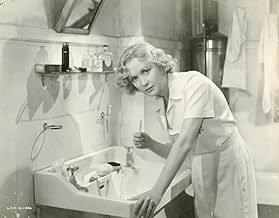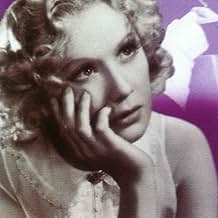Actor Edmund Davey becomes a star overnight when his wife and co-star teams up with the secretary of a noted stage critic to produce a glowing review of his 'Othello'.Actor Edmund Davey becomes a star overnight when his wife and co-star teams up with the secretary of a noted stage critic to produce a glowing review of his 'Othello'.Actor Edmund Davey becomes a star overnight when his wife and co-star teams up with the secretary of a noted stage critic to produce a glowing review of his 'Othello'.
Lawrence Grossmith
- Stanley
- (as Laurence Grossmith)
Noël Coward
- Passer-by
- (uncredited)
Rosamund Greenwood
- Pianist
- (uncredited)
James Harcourt
- Porter
- (uncredited)
Michael Hogarth
- Cassio
- (uncredited)
Noel Howlett
- Cashier
- (uncredited)
Paddy Morgan
- Kitty
- (uncredited)
Nicholas Nadejin
- Iago
- (uncredited)
Featured reviews
Theatre critic Mr Skeates's (A.E Matthews) secretary, Ann (Miriam Hopkins) re-writes a theatre review about Edmund (Sebastian Shaw) at the request of his wife, Barbara (Gertrude Lawrence) in order to paint Edmund in a good light. Following the review, Edmund has a successful career alongside his wife but Ann is given the sack. Edmund and Ann fall in love with each other but Barbara is still in the picture and they can only be together if Barbara is completely out of the way. Barbara and Edmund are both starring in Shaespeare's "Othello" and 'Desdemona''s death scene on stage seems the perfect opportunity for Edmund's 'Othello' to do what he deems necessary.
The women make this picture. Both Hopkins and Lawrence are good in their roles while a special mention must go to Laura Smithson as the maid "Katherine". She provides the best moment of the film when a painter (Sybil Grove) comes to try and blackmail her with a painting of Edmund and Ann together in the park - a painting that will cause scandal and obviously upset Barbara. The way that Katherine haggles down the price with the use of a knitting needle and a knife is most commendable and very amusing.
Unfortunately, the men most certainly are not Gods. They are very irritating with Sebastian Shaw coming off as the best, but only because he doesn't shout his way through the film or assault us with dialogue that is machine-gunned at us at 100mph. This is the technique used by both Matthews and Harrison and it is very irritating. It's as if they both thought - "hmm my character works for a newspaper. Let me think. I know, I'll talk really fast and shout a lot. Yeah, that's a good idea". Well it isn't and it ruins the film from the outset when we see the very pretentiously named A. E. Matthews dictate a review to Hopkins in this style. You think "Thank God!" when the scene is over, but then Harrison takes over with exactly the same style.
The story moves quite quickly but it has peculiar moments to it that don't make sense, eg, Barbara encouraging Ann and Edmund to spend time with each other, Edmund's love for Ann, and the ending where poor Ann is just discarded. We end the film feeling sorry for her. It's a film that is OK to watch with some irritating men and a couple of funny moments. Nothing more.
The women make this picture. Both Hopkins and Lawrence are good in their roles while a special mention must go to Laura Smithson as the maid "Katherine". She provides the best moment of the film when a painter (Sybil Grove) comes to try and blackmail her with a painting of Edmund and Ann together in the park - a painting that will cause scandal and obviously upset Barbara. The way that Katherine haggles down the price with the use of a knitting needle and a knife is most commendable and very amusing.
Unfortunately, the men most certainly are not Gods. They are very irritating with Sebastian Shaw coming off as the best, but only because he doesn't shout his way through the film or assault us with dialogue that is machine-gunned at us at 100mph. This is the technique used by both Matthews and Harrison and it is very irritating. It's as if they both thought - "hmm my character works for a newspaper. Let me think. I know, I'll talk really fast and shout a lot. Yeah, that's a good idea". Well it isn't and it ruins the film from the outset when we see the very pretentiously named A. E. Matthews dictate a review to Hopkins in this style. You think "Thank God!" when the scene is over, but then Harrison takes over with exactly the same style.
The story moves quite quickly but it has peculiar moments to it that don't make sense, eg, Barbara encouraging Ann and Edmund to spend time with each other, Edmund's love for Ann, and the ending where poor Ann is just discarded. We end the film feeling sorry for her. It's a film that is OK to watch with some irritating men and a couple of funny moments. Nothing more.
Men Are Not Gods is a film along the same lines as Ronald Colman's classic Oscar winner A Double Life, an actor who starts really getting into the part of Othello. This production from Alexander Korda is not anywhere near as good as A Double Life.
Miriam Hopkins who works with Rex Harrison at a London newspaper is persuaded by Gertrude Lawrence wife of Sebastian Shaw who are a British version of the Lunts to change the critic's review of her husband's Othello to a rave. Of course that gets her fired and rightly so, but she becomes a fan, the incarnation of the theater going public as Shaw puts it. He starts falling for her, but Lawrence is still very much in the picture.
Starting out as a comedy, Men Are Not Gods should have stayed that way. But the switch to drama is jarring and not really well prepared by the writers. When Colman did A Double Life the whole idea was to show how seriously he prepared for his roles, so much so that they took over his life. Shaw's ready to kill Lawrence for what, a quick roll in the hay with Hopkins?
Rex Harrison has very little to do here, but stand around and alternate between calf eyes at Hopkins and witticisms to the world. The film really made little use of his talents.
See Men Are Not Gods and you'll long for Ronald Colman.
Miriam Hopkins who works with Rex Harrison at a London newspaper is persuaded by Gertrude Lawrence wife of Sebastian Shaw who are a British version of the Lunts to change the critic's review of her husband's Othello to a rave. Of course that gets her fired and rightly so, but she becomes a fan, the incarnation of the theater going public as Shaw puts it. He starts falling for her, but Lawrence is still very much in the picture.
Starting out as a comedy, Men Are Not Gods should have stayed that way. But the switch to drama is jarring and not really well prepared by the writers. When Colman did A Double Life the whole idea was to show how seriously he prepared for his roles, so much so that they took over his life. Shaw's ready to kill Lawrence for what, a quick roll in the hay with Hopkins?
Rex Harrison has very little to do here, but stand around and alternate between calf eyes at Hopkins and witticisms to the world. The film really made little use of his talents.
See Men Are Not Gods and you'll long for Ronald Colman.
MEN ARE NOT GODS, a fascinating precursor to the justly lauded Ronald Coleman film A DOUBLE LIFE which in some ways surpasses its better known remake, is a rare film where a first class performance in one style clashes with a film exceedingly well made in another.
Alexander Korda gives us a well told tale of a drama critic's secretary who becomes entangled in the lives of a rising actor and his actress wife only to have the actor fall in lust with her and endanger his marriage, his very life and that of his wife when the lust becomes a consuming passion. A superbly chosen cast and settings build the story - from the final use of London's famed Alhambra theatre in Leicester Square for the production of OTHELLO which is at the core of the film (we get wonderful stretches of the play in a fine pre-Paul Robeson interpretation) to tiny touches like the Actor waiting in the wings snuffing out his cigarette presaging his "Put out the light...and then put out the light" speech.
Character actor A.E. Matthews is excellent as the drama critic, Rex Harrison shines in one of his best early supporting performances as the young obituary writer in love with the girl, Sebastian Shaw a fine British actor little known on this side of the Atlantic soars as the Actor breaking through as Othello and Gertrude Lawrence, the great stage star whose film career rarely showed her to best advantage gives one of her best performances as the Actor's wife and Desdemona (we even get to hear her singing Shakespeare's "Willow Song" beautifully! - although it is unclear if this from from the Othello Suite of Samuel Coleridge-Taylor used in the film's on-stage Othello or a setting by the film's composer, Geoffrey Toye?).
The only jarring note - and not all will find it jarring - is the over the top performance from top billed Miriam Hopkins, then near the peak of a successful Hollywood career, as the Critic's secretary persuaded by the Actor's wife to alter a crucial review of her husband's performance. Hopkins (17 Broadway credits of her own from 1921 to 1959, so one cannot blame the failure of her performance to blend with the others on her lack of the stage experience of her co-stars), has her character go essentially mad torn between loyalty to the Actor's wife and the two men who want her. In 1936 the idea of greater attraction between Hopkins and Lawrence than between her and either Harrison or Shaw was unthinkable (and beside the point in the story), but in 2011, one may see an unintended subtext.
Producer Korda and director Walter Reich turned out a marvelously detailed and satisfying film despite the clash of styles, but I do wonder at the IMDb listed running time of 90 minutes. The Greek-issued promotional DVD I screened comes in at a smoothly edited 79:20. I'd love to find a "more complete" print, but it's hard to imagine what might have been left out of this one!
Alexander Korda gives us a well told tale of a drama critic's secretary who becomes entangled in the lives of a rising actor and his actress wife only to have the actor fall in lust with her and endanger his marriage, his very life and that of his wife when the lust becomes a consuming passion. A superbly chosen cast and settings build the story - from the final use of London's famed Alhambra theatre in Leicester Square for the production of OTHELLO which is at the core of the film (we get wonderful stretches of the play in a fine pre-Paul Robeson interpretation) to tiny touches like the Actor waiting in the wings snuffing out his cigarette presaging his "Put out the light...and then put out the light" speech.
Character actor A.E. Matthews is excellent as the drama critic, Rex Harrison shines in one of his best early supporting performances as the young obituary writer in love with the girl, Sebastian Shaw a fine British actor little known on this side of the Atlantic soars as the Actor breaking through as Othello and Gertrude Lawrence, the great stage star whose film career rarely showed her to best advantage gives one of her best performances as the Actor's wife and Desdemona (we even get to hear her singing Shakespeare's "Willow Song" beautifully! - although it is unclear if this from from the Othello Suite of Samuel Coleridge-Taylor used in the film's on-stage Othello or a setting by the film's composer, Geoffrey Toye?).
The only jarring note - and not all will find it jarring - is the over the top performance from top billed Miriam Hopkins, then near the peak of a successful Hollywood career, as the Critic's secretary persuaded by the Actor's wife to alter a crucial review of her husband's performance. Hopkins (17 Broadway credits of her own from 1921 to 1959, so one cannot blame the failure of her performance to blend with the others on her lack of the stage experience of her co-stars), has her character go essentially mad torn between loyalty to the Actor's wife and the two men who want her. In 1936 the idea of greater attraction between Hopkins and Lawrence than between her and either Harrison or Shaw was unthinkable (and beside the point in the story), but in 2011, one may see an unintended subtext.
Producer Korda and director Walter Reich turned out a marvelously detailed and satisfying film despite the clash of styles, but I do wonder at the IMDb listed running time of 90 minutes. The Greek-issued promotional DVD I screened comes in at a smoothly edited 79:20. I'd love to find a "more complete" print, but it's hard to imagine what might have been left out of this one!
Ann is the secretary for a theatre critic...a critic who is about to savage the performance of Edmond Davey as Othello. But something weird (and completely unbelievable) happens...the Mrs. Davey (who plays Desdemona) begs the secretary not to send the article to the printer. While I have no idea why, Ann does something else...she changes the article to make it appear as if the reviewer LOVED Davey's performance! Not surprisingly, Ann loses her job. But then she does something else very strange...she goes to see "Othello" and soon finds herself falling in love with Edmond! Eventually, he begins to feel the same and soon you wonder if the finale of the next production might REALLY result in the death of Desdemona!
There are two main problems with the film. A few performances are a bit shrill--particularly Miriam Hopkins as Ann. Additionally, again and again, the actions of folks (most often but not exclusively Ann) make little sense. For a better take on "Othello", try "A Double Life".
There are two main problems with the film. A few performances are a bit shrill--particularly Miriam Hopkins as Ann. Additionally, again and again, the actions of folks (most often but not exclusively Ann) make little sense. For a better take on "Othello", try "A Double Life".
This melodramatic affair, with a comedic component prominent in its first half, showcases American Miriam Hopkins amidst an English cast and setting and she performs very well in a role that is not written in a unified fashion. Ann Williams (Hopkins) is personal secretary to Mr. Skeates, caustic theatre critic for the London Daily Post. Skeates has dictated to Ann a very negative review of a new production of Shakespeare's Othello, particularly focussed upon his perceived shortcomings of its titular lead, played by Edmond Davey (Sebastian Shaw). Before Ann has an opportunity for submitting the review to press, she is called on at her office by Barbara Halford (Gertrude Lawrence), the maligned performance's Desdemona and also Davey's wife. As a result of Barbara's entreaties in support of her husband, Ann alters the review causing Davey, who had suffered first-night jitters, to become a great success, after which Ann and he share mutual infatuation with complications ensuing. Director Walter Reisch is responsible for the work's storyline but the screenplay, written by others, falls short of his high standard. His direction is inventive throughout the quickly moving piece, and montage is seamless. Lawrence, a great actress, and Hopkins each displays keen awareness of the importance of body movement and control; there is not a slack moment when these share the screen. Indeed, the acting is quite good by most of the cast throughout, with the exception of the always peculiar Rex Harrison who performs as Ann's suitor with his customary prissy mannerisms; fortunately, his appearance time is minimal. Reisch, in accord with cinematographer Charles Rosher, provides thoroughly interesting visuals by way of cleverly designed shots employing fluid camerawork for tracking and full images as well as for closeups. As stated in the script by Skeates, the music is drawn from themes within the Othello Suite of Samuel Coleridge-Taylor, augmented by a melodic Geoffrey Toye score. In a whimsical scene, Skeates enters his office, populated by a bevy of Daily Post secretaries, while a phonograph plays a jazzy rendition of "Who's Afraid of the Big Bad Wolf?" Vincent Korda's interiors are superb for this production under the aegis of his brother Alexander and the costumes crafted by Rene Hubert are faultlessly designed. Only the age of the available print reveals an editing misstep or two. The highly capable control of extras comes from one of the assistant directors, Jack Clayton, renowned later as helmsman of his own productions. This engaging love triangle features locations scattered through London, including Hyde Park and Trafalgar Square. The footage from Shakespeare's play (the title is from Act III/Scene IV) is shot in the venerable Alhambra Music Hall (now the famous film theatre Odeon) in Leicester Square within London's West End. It was the last performance given at the Alhambra, torn down at the completion of the filming of MEN ARE NOT GODS.
Did you know
- TriviaAccording to a studio press book on this movie, the demolition of the Alhambra Theatre was delayed so that it could be used for staging the play "Othello" for this production.
- GoofsThe "goodbye" letter Ann writes to Edmund is not the same one as he is initially shown holding and reading. The words are the same, but the formatting is completely different. After speaking with Tommy, a close-up of the original is seen again.
- Quotes
Barbara Halford: [to Edmund] Now, now go and find Ann - and say something nice to her.
- ConnectionsReferences Three Little Pigs (1933)
Details
- Release date
- Country of origin
- Language
- Also known as
- Triangle
- Filming locations
- Hyde Park, Westminster, Greater London, England, UK(Ann and Edmund meet near the bandstand)
- Production company
- See more company credits at IMDbPro
- Runtime1 hour 30 minutes
- Color
- Aspect ratio
- 1.37 : 1
Contribute to this page
Suggest an edit or add missing content


